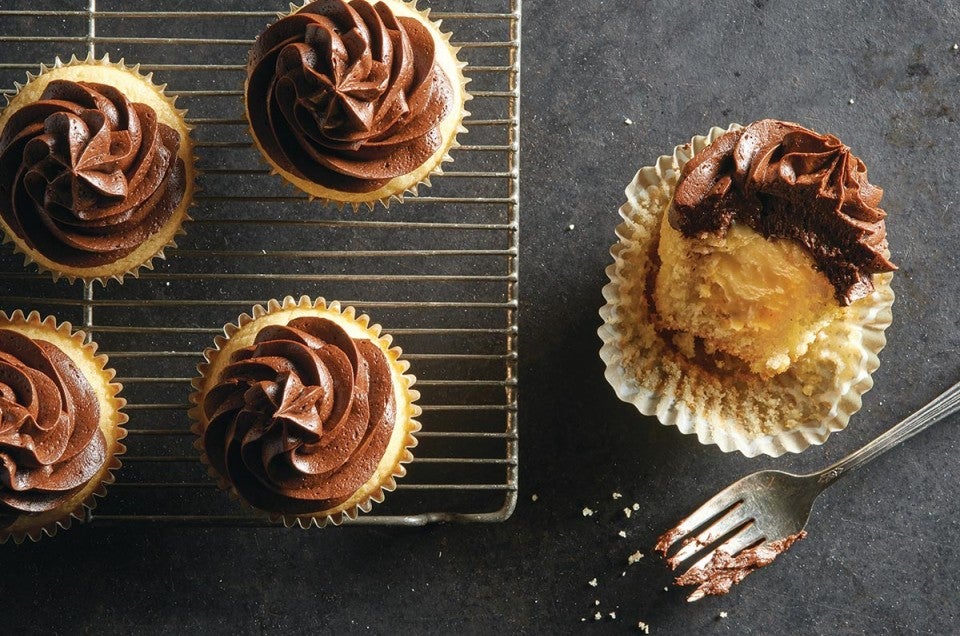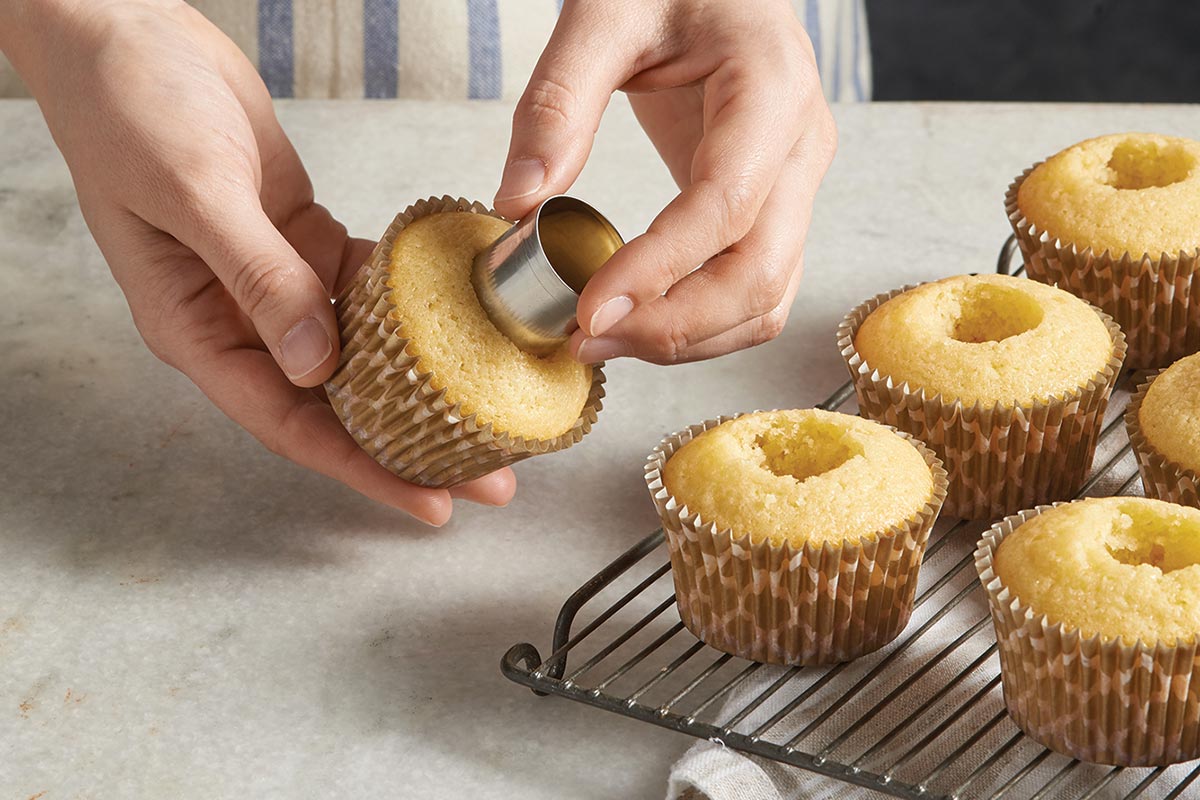


The best baked goods include some sort of pleasant surprise. Maybe it’s an unexpected flavor combination or a delightful texture that's softer than anything you thought possible. Or perhaps it’s a secret pocket of additional flavor tucked inside a seemingly ordinary dessert — those are the baked goods that are impossible to eat without a smile.
The ideal canvas for stuffing a delicious surprise inside? Filled cupcakes!

From the outside, stuffed cupcakes may look unremarkable. But with a bit of creativity and some technical skill, they can be just as impressive as full-size cakes. Cupcakes are mini cakes, after all. They deserve the same attention and treatment as large cakes — if not more since they're tiny and cute!
When they're filled with buttercream, zesty curd, rich ganache, or even pastry cream studded with colorful sprinkles, filled cupcakes are the epitome of baking with joy.
You'll master the basic process of how to stuff a cupcake after a batch or two. Start with tried-and-true flavor pairings, and then let your inner wild scientist-meets-baker run free and dream up unique combinations to try.

There are a few simple guidelines to keep in mind when you're making filled cupcakes. The first is about the cake itself: can you use any cupcake recipe to make stuffed cupcakes?
The good news is the answer is yes — mostly.
Cupcakes that are destined to be filled need to be sturdy enough to withstand having their centers removed and not completely crumble upon first bite.
Most standard cupcakes recipes are up to the task: creamed (butter and sugar), oil-based, hot milk, and even some special-diet cupcakes like gluten-free and those made without sugar can be stuffed.
You could even start with a basic cake recipe, convert it into cupcakes, and then fill them.

So which kinds of cake or cupcake recipes won't work as filled cupcakes? Avoid the following for best results:
Generally, use a recipe that yields flavorful cupcakes that are soft but also sturdy and skip any mix-ins.
On to the filling! The same philosophy applies to the tasty centers of your filled cupcakes: almost any frosting, curd, pastry cream, or fruit spread can work. Here are a few of our favorites:

Think about biting into a cupcake — you don't want anything that's too dense or sticky. (Marshmallow spread makes the cut and so does caramel, as long as it's cooked to soft-ball stage to avoid creating a hard center.)

Avoid fillings that aren't stable at room temperature (like ice cream or semifreddo); have a very runny, liquid viscosity (they'll get absorbed by the cake and disappear); or are difficult to portion or pipe into a well about the size of your thumb. That small well is exactly where we're going next!
To make room for the flavorful filling, the cupcakes must be cored, or have the centers removed. Some bakers like to use a cupcake corer for this — a metal cylinder that's about 3/4" in diameter and 2" tall. You can also use a metal pastry tip that's a similar size or a simple paring knife.

Once the cupcakes are baked and fully cooled, insert the corer or the open end of the pastry tip into the middle of the cupcake, pressing it about three-fourths of the way through the cupcake. Twist the corer a few times and then remove it.
Sometimes the center will pop out when you remove the corer or your knife. If it doesn't, use your fingers to pull out the core. Ideally, the hole that's left behind is deep (room for lots of filling!) but doesn't go all the way to the bottom (in which case you'll have a leaky cupcake). Using cupcake papers helps provide extra insurance so that if you do make your cuts a little too deep, any errant filling will be contained.
If the cupcakes seem like they're getting quite compressed during this coring phase, pop them into the freezer for about 10 to 15 minutes to help them firm up. They'll cut more cleanly and will return to their soft, spongy texture upon thawing.
Once your cupcakes are cored, they're ready for filling! Depending on the consistency of your filling, choose a tool that'll make easy work of portioning it into the centers:
When you're ready to fill your cupcakes, use your selected tool to generously add the filling all the way to the top of the hole. (They're called "stuffed cupcakes" for a reason — pack that yummy filling in there!)

Allow the fillings to settle for a few minutes, then top off any of the centers that seem low. You can chill the cupcakes at this point if you want to encourage the fillings to set. Just be sure to allow them to come to room temperature before serving if they're butter-based cupcakes, which harden when cold. Oil-based cupcakes will retain their spongy texture when chilled, so this style of cake is a good match for cold-set fillings.
Bottom line: chilling your cupcakes will make them easier to handle during the next step — frosting.
Garnish your swoon-worthy cupcakes with the frosting or topping of your choice. Use the skills you'd normally use to frost cupcakes, piping an elegant design on top, if desired.

If your filling is thick enough, you could probably dip the top of your cupcakes into a bowl of warm chocolate ganache. However, this move is for the adventurous cupcake-stuffers. I'll be taking the safe road and piping mounds of chocolate frosting on top instead, leaving the filling tucked safely inside.
Easy, right? Bake cupcakes, whip up a filling, core the center, fill, and frost! Then you'll have a dessert that looks like it belongs on the cover of a baking magazine.
One thing to keep in mind throughout all these steps is the flavor profile you're building. You have at least three opportunities to select ingredients that will contribute to the overall taste: the cake, filling, and frosting.
Remember when you bake, you're in charge; the only person setting the guardrails for the flavor is you. There are some classic flavor pairings that just work, while other more creative options may be surprisingly delightful. Here are some stuffed cupcake combos that include a bit of both:
These are just a sliver of all the possible flavor combinations — start thinking outside the cake box. What flavors appeal most to you? How can you combine them in new ways and use a variety of textures to create a uniquely delicious cupcake experience?

At the end of the day and at the bottom of the cupcake, baking is about joy. So gather your favorite cake, filling, and frosting recipes and use them to make filled cupcakes that maximize both flavor and happiness. Stuff them full of love and share them with the people you love — filled cupcakes taste best when eaten among friends and family.
Let us know what flavor combination you think would be most delicious in the comments, below. You just might inspire our test kitchen!
Photos by John Sherman unless otherwise noted.